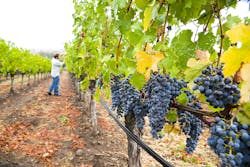Australian researchers are working on ways to turn winery waste products into natural compounds that can be reused in the winemaking process.
Researchers from the Department of Chemistry and Biotechnology at Swinburne University in Melbourne are building on a doctorate research project to turn winery waste into something more valuable.
“Australia produces around 1.8 million tonnes of wine grapes every year. After the grapes are crushed almost half of that amount — comprising skins, pulp, stalks and seeds — is disposed of as solid waste in landfill, polluting the environment,” explained chemist Dr. Avinash Karpe, whose initial doctorate research project investigated turning this waste into biofuels.
In the European Union, the organic waste left over after grape pressing has been classified as industrial waste.
As part of the new project, Swinburne will provide research and development support for wine and beverage company DAL Group Australia (DGA).
Earlier this year DGA acquired Southern Estate Wines, whose Griffith facility in New South Wales is capable of producing 20 million liters of wine.
“We’re interested in exploring what we can do within the parameters of winemaking to get the best possible product — and that’s all natural, not artificially manufactured,” said a spokesperson for DGA. “The possible cost efficiencies to industry are simply astonishing. Never before have we seen such an opportunity.”
Microbiologist Professor Enzo Palombo, chair of Swinburne’s Department of Chemistry and Biotechnology, said: “At the time we approached DGA, we were looking for a client for the technology we had developed.
“It became apparent that the wine industry had other possible applications, so we started the conversation about how we could work with DGA, and the wine industry in general, to find solutions to other problems.
“In a way, we are acting as the R and D arm of their business.”
